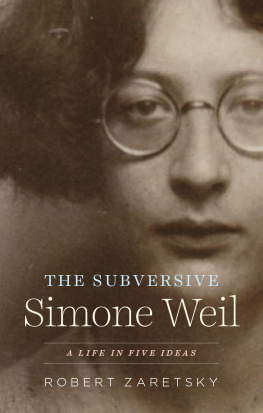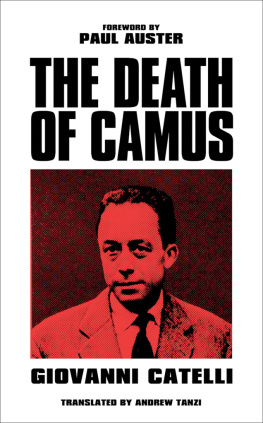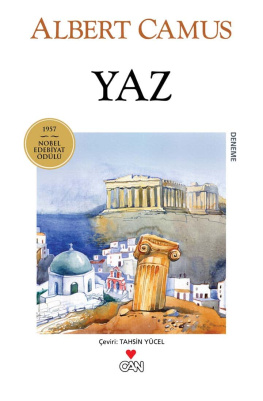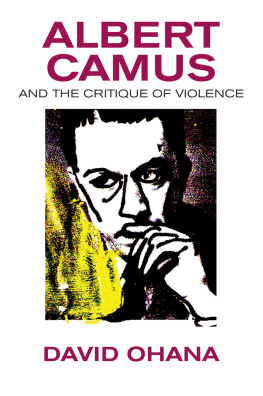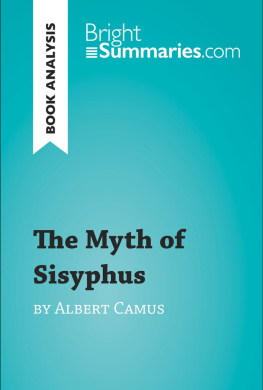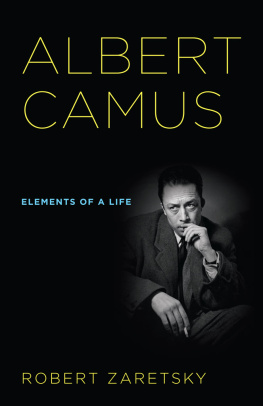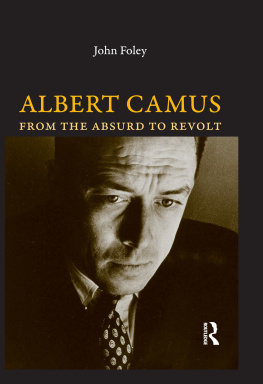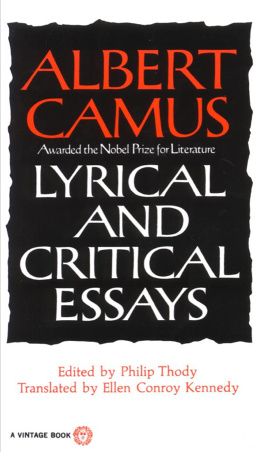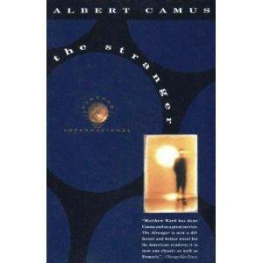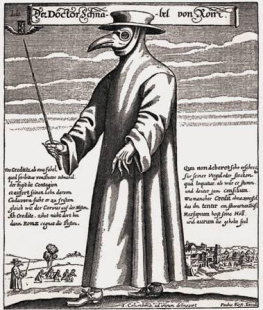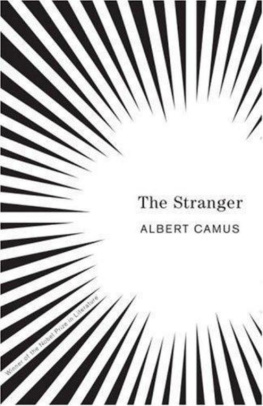A LIFE WORTH LIVING
A LIFE WORTH LIVING
Albert Camus and the Quest for Meaning
ROBERT ZARETSKY
THE BELKNAP PRESS OF
HARVARD UNIVERSITY PRESS
Cambridge, Massachusetts, and London, England
2013
Copyright 2013 by the President and Fellows of Harvard College
ALL RIGHTS RESERVED
Photograph by Bernard Rouget (c) Ph&Ph Rouget
Jacket design by Jill Breitbarth
The Library of Congress has cataloged the printed edition as follows:
Zaretsky, Robert, 1955
A life worth living : Albert Camus and the quest for meaning / Robert Zaretsky.
pages cm
Includes bibliographical references and index.
ISBN 978-0-674-72476-1 (hardcover : alk. paper)
1. Camus, Albert, 19131960. 2. Conduct of life. I. Title.
B2430.C354Z37 2013
194dc23
2013010473
CONTENTS
Even my death will be contested. And yet what I desire most today is a quiet death, which would bring peace to those whom I love.
Albert Camus prediction, written in the last decade of his life, has been borne out, though perhaps not his hope. Over the past several years, contests have simmered and burst over the French Algerian writers legacy.
Shortly after becoming Frances president, Nicolas Sarkozy made a state visit to Algeria. The visit garnered more than the usual attention, in part because Sarkozy had come to office with a reputation as a bluntly spoken conservative who saw no reason for France to apologize for its role as a colonial power. One of the stops on his itinerary was Tipasa, a mountainous town overlooking the Mediterranean. Not only does Tipasa boast a stupendous array of Roman ruinsthe graveyard of an earlier colonial enterprisebut it is also a site to which Camus had made a series of pilgrimages during his short life.
Two of his most lyrical essays, Nuptials at Tipasa and Return to Tipasa, express his deep attachment to the village. The first essay, written in 1936 when Camus was an underemployed young man with oversized ambitions, describes his experience at Tipasa in frankly erotic terms: Everything seems futile here except the sun, our kisses, and the wild scents of the earth. Here, I leave order and moderation to others. The great free love of nature and the sea absorbs me completely.
Nearly twenty years later, now a world-renowned and self-doubting writer, Camus returns to Tipasa. As he approaches the village, he remembers a visit he had made right after the end of World War II. Events had transformed the ancient site: soldiers and barbed wire now surrounded the columns and arches where he had once posed shirtless, smiling, and surrounded by female friends. During that postwar trip, Camus spirit also seemed imprisoned; there was, of course, the backdrop of a world that had run amok: Empires were crumbling, men and nations were tearing at one anothers throats; our mouths were dirtied. But there was, as well, a youth now lost: On the promontory I had loved in former days, between the drenched pillars of the ruined temple, I seemed to be walking behind someone whose footsteps I could still hear on the tombstones and mosaics, but whom I would never catch up with again.
But these bleak recollections give way to something much older, yet at the same time younger than our drydocks or our debris. The abiding splendor of Tipasa, Camus discovers, stubbornly resists the modern worlds insanity: I found an ancient beauty, a young sky, and measured my good fortune as I realized at last that in the worst years of our madness the memory of this sky had never left me. It was this that in the end had saved me from despair. Algeria was by then lurching toward civil war and though Camus makes no explicit mention of the events that were already set in motion, he seems to steel himself for the future: I have not been able to deny the light into which I have been born and yet I have not wished to reject the responsibilities of our time.
Posed in front of a sparse crowd dutifully waving flags of both countries, President Sarkozy gazed at the sea while listening to a member of his entourage recite a passage from Nuptials at Tipasa. Perhaps Return to Tipasa was too ambiguous or too political a text. In any case, when the production ended, actors and audience returned to their cars and the presidential motorcade continued to its next stop, leaving behind the ruined temple and young sky, as impervious to political posturing as are the elusive meaning and deep beauty of Camus essays.
Three years later, in 2010, with the approach of the fiftieth anniversary of his death, Camus was again at the heart of French politics when Sarkozy suggested that Camus remains be moved to the Pantheon. Voices on the Left immediately assailed Sarkozy for trying to recuperate Camus legacy for his own political benefit. They insisted that his remains be kept in Lourmarin, the Provenal village that he discovered soon after the war and where, with the aid of his close friend, the poet Ren Char, he moved a few years before his death. The Right, for whom Camus is a neoconservative avant la lettre, declared itself shocked by these accusations. The controversy also divided Camus twin children: while his son Jean denounced Sarkozys effort to turn his father into an icon of the Right, his daughter Catherine, executor of her fathers literary estate, thought that Camus pantheonization would crown his lifelong desire to speak for those who had no voice.

While Camus remains are still at rest in Lourmarin, the meaning and significance of his work will never be.
Few writers were more conflicted over personal and national identity than Camus. He was a pied-noir, the moniker given to immigrants who during the nineteenth and twentieth centuries came to French Algeria from other parts of Europe, becoming citizens of a nation, France, whose language they did not speak, whose history they did not know, and whose soil they would probably never step foot on. But this seemed unimportant at the time: Algeria was considered part of France, not a foreign nation containing several million Arabs and Berbers deprived of the rights of citizenship. By the 1950s, Camus resembled his mythic hero Sisyphus, bolted not to a pillar, but instead to the tragic impasse of Algerias resistance to a foreign occupationa French occupation. For many years, Camus labored for a solution that would satisfy the imperatives of justice for both Arabs and pieds-noirs, risking his life in pursuit of an impossible peace. Camus failed and fell silenta silence he maintained until his death in 1960.
While Camus the Algerian continues to divide opinion in France, there is a movement toward consensus in Algeria, where an increasing number of Algerian writers claim him as one of theirs. This has been especially true since the mid-1990s and the so-called Second Algerian War fought between the government and Islamic fundamentalists. The Algerian novelist (and member of the Acadmie franaise) Assia Djebar has enrolled Camus in her cortege of Algerian political martyrs. He is, she writes, one of the heralds of Algerian literaturea fraternal spirit she calls to her side in order to gaze and reflect upon together the bloody shambles of Algerias past.
What draws these Algerian writers to Camus is less his particularity as an Algerian writer, than the universality of his concerns. This is yet another reason why he continues to make us uneasy. Whether seen from Tipasa or Paris, Camus remains the man whose life stands as witness to a kind of desperate heroism. His fierce condemnation of republican Frances treatment of Arabs and Berbers, his whipsaw denunciation of Vichy Frances anti-Semitic legislation, his lifelong opposition to the death penalty, his courageous effort to negotiate a civilian truce in war-torn Algeria all reflect the acts of a man who sought to mesh his life with his thought. He failed, at times, to do so. For example, during the period straddling the last months of Frances occupation and first months of liberation, Camus suppressed his deeply rooted aversion to capital punishment, not only justifying but demanding the death penalty for those whose wartime collaboration led to the death of Frenchmen. It speaks to Camus moral resilience that he eventually renounced this position, admitting publicly that he had been wrong; nevertheless, rereading his wartime articles calling for rapid and merciless justice chills ones blood.
Next page

